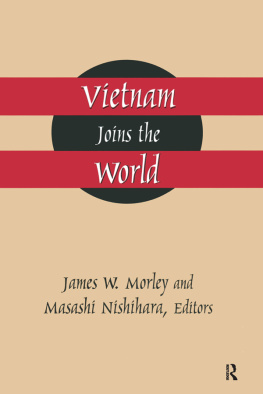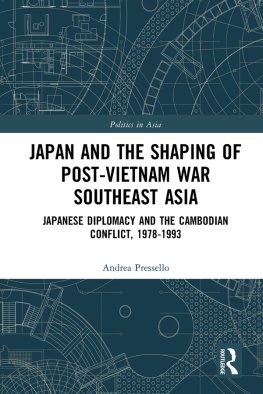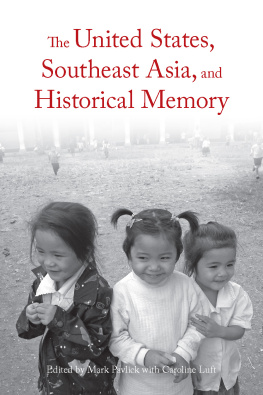An East Gate Book
First published 1995 by M.E. Sharpe
Published 2015 by Routledge
2 Park Square, Milton Park, Abingdon, Oxon OX14 4RN
711 Third Avenue, New York, NY 10017, USA
Routledge is an imprint of the Taylor & Francis Group, an informa business
Copyright 1997 Taylor & Francis. All rights reserved.
No part of this book may be reprinted or reproduced or utilized in any form or by any electronic, mechanical, or other means, now known or hereafter invented, including photocopying and recording, or in any information storage or retrieval system, without permission in writing from the publishers.
Notices
No responsibility is assumed by the publisher for any injury and/or damage to persons or property as a matter of products liability, negligence or otherwise, or from any use of operation of any methods, products, instructions or ideas contained in the material herein.
Practitioners and researchers must always rely on their own experience and knowledge in evaluating and using any information, methods, compounds, or experiments described herein. In using such information or methods they should be mindful of their own safety and the safety of others, including parties for whom they have a professional responsibility.
Product or corporate names may be trademarks or registered trademarks, and are used only for identification and explanation without intent to infringe.
Library of Congress Cataloging-in-Publication Data
Vietnam joins the world / James W. Morley and Masashi Nishihara, editors.
p.cm.
An East Gate book.
Includes index.
ISBN 1-56324-974-X (alk. paper).ISBN 1-56324-975-8 (pbk. : alk. paper)
1. VietnamForeign relations.
2. VietnamHistory1975
I. Morley, James William, 1921
II. Nishihara, Masashi.
DS559.912.V54271996
327.597009049dc21
96-39809
CIP
ISBN 13: 9781563249754 (pbk)
ISBN 13: 9781563249747 (hbk)
This book is the outgrowth of a joint project on the former Indochina states inaugurated at a meeting in New York in 1990 of the ten authors here presented, together with selected other scholars and officials from Japan, the United States, and various Southeast Asian countries. At that time Cambodia was bogged down in a devastating civil war. Vietnam was grappling with ways to transform itself that were little understood abroad. And the two most influential countries in the Asia-Pacific region, Japan and the United States, appeared to be moving down different tracks.
Japan recognized the Sihanouk-led government of the three opposition factions in Cambodia and sustained its long-time relations with the government in Vietnam. The United States, on the other hand, refused to recognize either Cambodian government and, with Vietnam, refused to permit even commercial or humanitarian contact. While Japan and the United States were exchanging views with each other and showing some understanding of each others interests and perceptions, the United States worked inside the circle of the permanent five members of the United Nations Security Council; Japan, outside.
It seemed obvious to the group assembled in New York that unless Japan and the United States could come to a more common understanding of the situation in this area and achieve a greater harmony of views, they were in danger of frustrating positive developments there. They were in danger also of weakening their own partnership and impeding the development of the broader Asia-Pacific community both desired.
Was there something that concerned citizens could do to help ward off these possibilities? The Research Institute on Peace and Security, an independent research center in Tokyo, and the Pacific Basin Studies Program, a teaching and research program of the East Asian Institute and the Center on Japanese Economy and Business of Columbia University in New York, decided to try.
The five Japanese and five American specialists who have contributed chapters to this volume were recruited as country core groups. A multiyear research program was devised that has involved each core groups making periodic visits to Cambodia and Vietnam (the Japanese group also visited Laos and China) to interview officials and private persons, gather materials, and form firsthand impressions. Following each of these dual visits, the two groups have met together and in consultation with knowledgeable officials, scholars, and businesspeople who have shared their impressions. After each such session, the two core groups have then worked privately to draft a common report of their findings and recommendations. These have been circulated to interested persons and discussed with appropriate government and business leaders in each country. Five such reports have been issued, the last in January 1994.
Fortunately, over these years, the situation in the peninsula has greatly improvedin Cambodia, the Agreement on a Comprehensive Political Settlement, the UN intervention, and the establishment of a legitimate government; in Vietnam, the economic liberalization, the opening of the country, and the resumption of humanitarian and commercial relations by the United States. In the course of these developments Japan and the United States have come to a clearer perception of their common interests in the area and have worked more and more constructively together.
The situation in Cambodia is still fragile. The new coalition government is insecure, the Khmer Rouge insurrection goes on, and the country lies in desperate need of international assistance. But we have chosen in this volume to focus on Vietnam. There a historic new era is about to begin as Vietnam struggles to throw off its old controlled economy and bring itself into the modern world, and as the United States, having established diplomatic relations, prepares for full normalization, and Japan, being relieved of the many inhibitions it has been operating under in deference to its American ally, reinvigorates its thrust into Southeast Asia.
It is particularly urgent at this time, therefore, that the American and Japanese people know more about Vietnam. What kind of country is it becoming? Will its market reforms work? Will its society benefit? Will the Communists remain in power? Will it succeed in establishing cooperative relations with its neighbors? What interest do Americans and Japanese have in it and what should be our policies toward it?
The authors of this volume do not claim to have definitive answers to these and other important questions. The future is always unknowable. In any event, the facts about Vietnam are elusive and the judgments are uncertain. Nevertheless, the future does not wait. Important decisions are pressing. And having had the privilege of observing Vietnam at first hand over the past several years, we should like to make what contribution we can to the wider public discussion that is now required.










